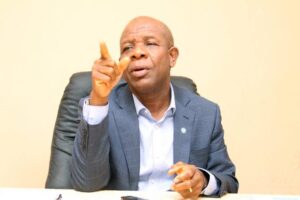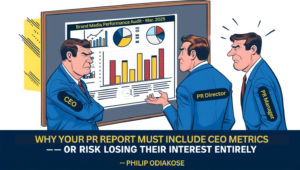
Eniola Mayowa
In this interview, Public Relations expert, Public Speaker and CEO, Stepcraft, Eniola Mayowa, talks about issues surrounding PR practice in Nigeria, insisting practitioners have not been able to be part of the solution to the nation’s huge image deficit issue since the practice is still being largely snubbed by government. Excerpts:
Q: Stakeholders in the industry believed PR Measurement and evaluation has become essential to truly know the impact of PR on the bottomline? To what extent would you agree with this?
I think PR measurement is good for the practitioners and the practice; since at the end of the day, we’ll be able to ascertain our contributions in the whole marketing mix. At least, we’ll be able to ask the question: “All these things that I’m doing, how do they add to the bottomline?” I want to say that it is what all practitioners should actually embrace. It would help us. It would help the industry. It would enable us tell the clients that this is the value we are adding to their business.
Q- But why are some practitioners reluctant to accept such a beautiful idea?
I’ll expect that they have their reasons. But, for me, I want to be able to measure what I’m bringing to the table. Evaluation is something that is very important. It is what any business structure should actually welcome.
Q- Besides Lagos, Abuja and a few other NIPR Chapters, PR activities seem to be inactive in many of the states across the country. What do you think these inactive chapters can learn from Lagos and others that are active?
Lagos Chapter of NIPR is not the premier PR Chapter for nothing. If you also look at the business ecosystem, Lagos actually has that advantage. Most of the corporates and big organizations are in Lagos. So you can’t take that away. In any case, we also have many other chapters that are also very active besides the ones you mentioned here. And, kudos to the current president of NIPR, he is doing many things in this regard. But I think there is still a lot of things other chapters can actually copy from Lagos. Though they might not be able to do them in the magnitude Lagos does it. Most of these other chapters are largely driven by government patronage, unlike Lagos, where we have organisations that are doing well more than Lagos. The chapters can actually liaise with government agencies in their states to brief them on what NIPR can bring to the business ecosystem. What they need to do is to engage and collaborate more.
Q- How should practitioners be seeing technology; since some have begun to nurse the fear that it has come to remove food from their table?
By my personality, I love growth and change. Whatever brings about change, I always ask what is in it for me, rather than resist it. So for me, I see the world of tech that we have now as an enabler. I do not see it as a competition at all. I do not see it as something that has come to take my business. You know I’ve gone to take some courses in Artificial Intelligence (AI), and I can tell you that I’m AI-certified. Why? I don’t want to be left behind. It’s important that we embrace it. So I see these techs as an enabler. They enable those who imbibe it to do more. But, it will excuse those who are not ready to embrace it eventually. So it’s in our interest to value it and maximize the value it will bring to our business.
Q-How do you feel being in a male-dominated industry?
I partially agree with your submission that it is a male-dominated industry. It’s looking like that because we have the guys at the topmost level. At the entrance we have the women, but when it gets to the middle level or the topmost level, they are already phased out due to personal demands like marriage, and all other things. When you look at the hierarchy: the senior, the middle level, and the entrance, and you aggregate all of these, you discover that it’s not so much of male dominated. But we will continue to push as much as we can. The female folk should not give up. They should not quit the industry when they should be aiming for the zenith of their profession.
Q-What’s your assessment of the state of PR practice today?
It’s mixed. This is because we are not immune to the economic situation in the country, today. We’ve had instances where you had a brief, you had prepared a fantastic presentation only to be turned down at the end of the day due to low or no budget. But, we also have the prospect of some new businesses coming into the country. So it’s neither here nor there. While we have new businesses springing up, people that would ordinarily need PR services are constrained for budget. So PR is not immune to what is affecting everybody.
Q: A lot of people are of the belief that Nigeria’s inability to fix her image problem is partly an indictment on PR practitioners in the country. It’s like having a millionaire in house, but with family members starving. What’s your take on this?
Let me start with the analogy you’ve used. If you have a millionaire in the house and family members are starving, perhaps those family members do not recognize that person as a millionaire. Recognition and respect for PR practice and practitioners is still a struggle with government for instance. You know very well, many a time when those in government needed somebody to manage their reputations, they go outside PR. Another thing is that, even if they go for other people, the question is: what is the pedigree of these individuals? One thing you should note is that PR is not designed to market a product that is being damaged, consistently. It would be difficult for PR to manage such, because PR is a deliberate effort to do the right things, and project those right things so that you can get into the heart of your target, for them to admire you, accept you, and romance you. It’s a goodwill thing. So if, for instance, as a product, you constantly do things that hurt your consumers, you can’t support that with PR, because it won’t work. So PR is the good that you do, deliberately over time, for you to be able to win the heart and soul of your target. So to say that the reputation deficit that we have in the country is an indictment of PR, I’ll say no because if given the opportunity we ‘ll definitely influence the image, but where there is no opportunity, we are limited.
Q- What informed the decision to float Stepcraft?
Change is constant. So also is growth. You can not continue to be in a space, sometimes you will outgrow that space. That’s what birthed Stepcraft. And to the glory of God, we are progressing.






Comments